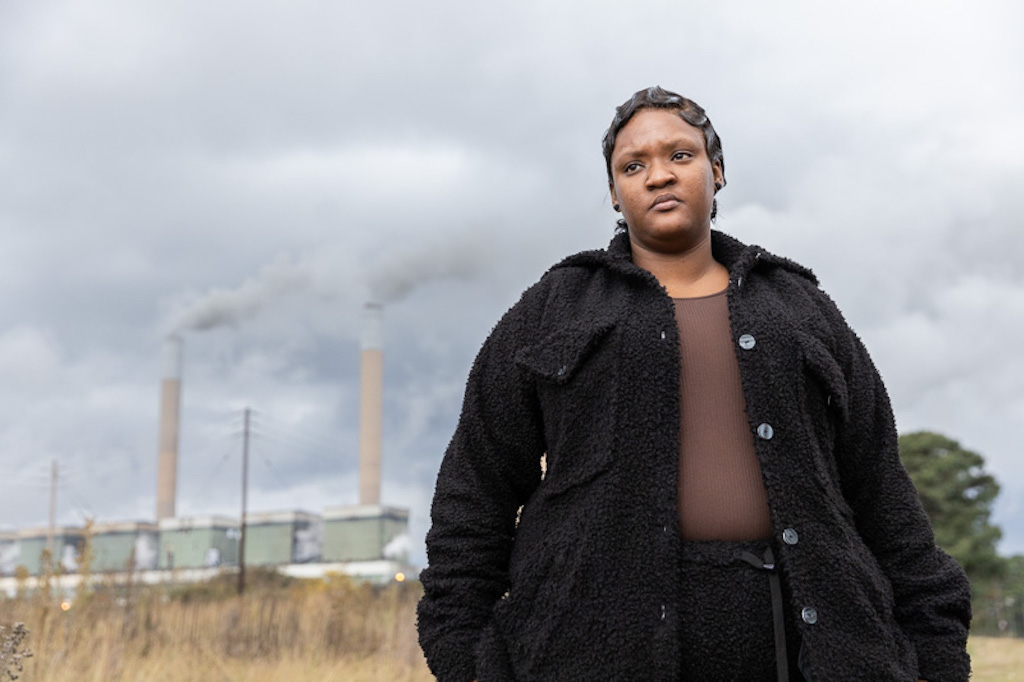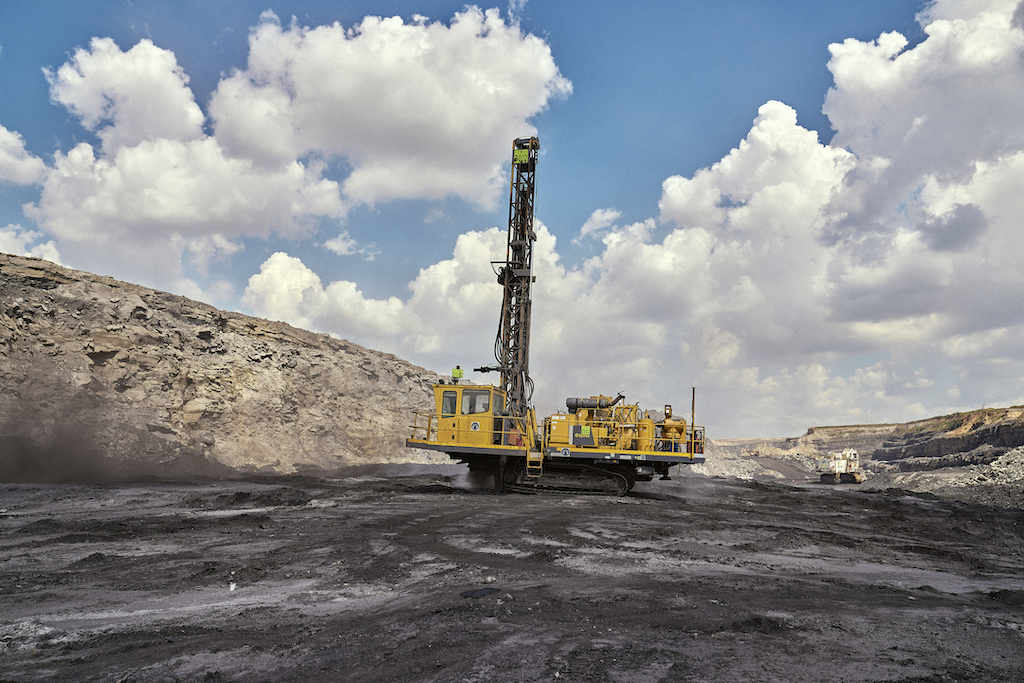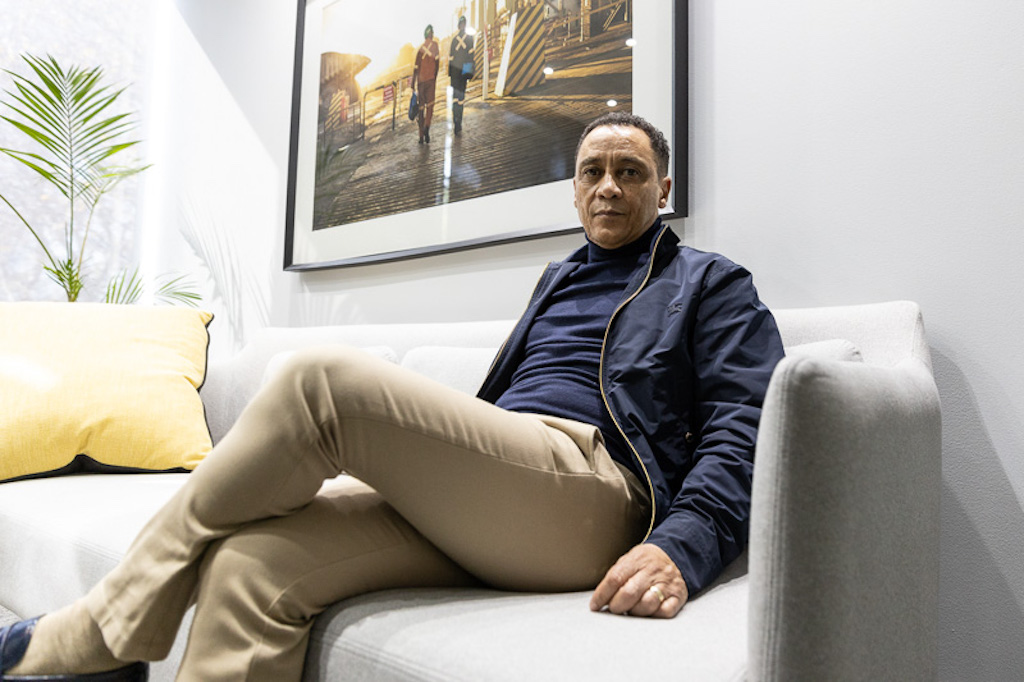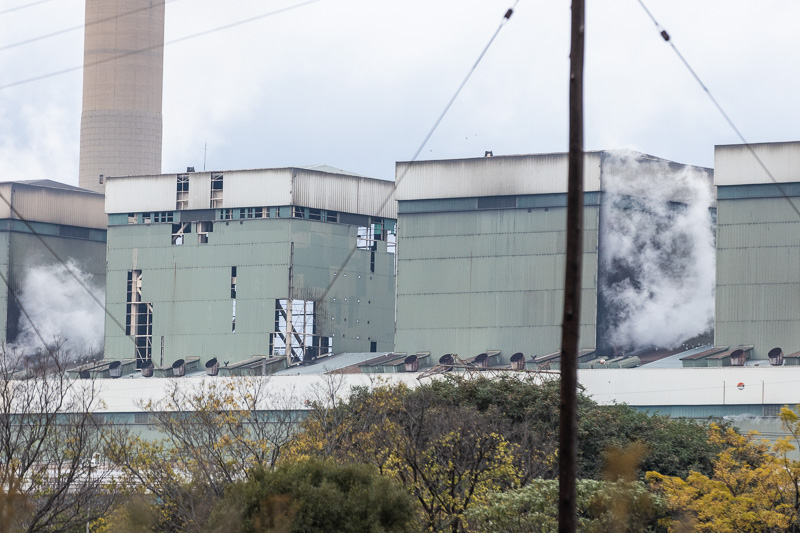
19 Jun SA’s coal lobby pushes back against green transition
Coal lobbying has long been an influential force in South Africa’s politics and economy. Thabo Molelekwa investigates its impacts on green energy investments

Pascaline Mazibuko: ‘We have been lobbying, and will continue to lobby our people to say, reject this transition. It is not going to work for us.’ Photo: Ashraf Hendricks
Pascaline Mazibuko is a former local politician who is lobbying against the phasing out of coal mining in Emalahleni – named the “place of coal” – in Mpumalanga province, South Africa’s energy heartland.
Mazibuko (29) was a proportional councillor in the Emalahleni Local Municipality from 2015 to 2020, and now works for the South African National Civic Organisation as the provincial spokesperson. She set up the Bullet Mkabayi Foundation, which she says has an interest in the mining industry “to build the economy of Mpumalanga” but does not receive any funding.
For her, it does not make economic sense to replace coal with renewable energy and there is no realistic plan of how businesses are going to be assisted so that employment in the energy heartland is secured.
She is a vocal presence at local consultations about the Just Energy Transition and meetings with political leaders such as the Mpumalanga premier, the Department of Mineral Resources and the Presidential Climate Commission. “We have been lobbying, and will continue to lobby our people to say, reject this thing. It is not going to work for us,” Mazibuko told Oxpeckers.
She said the government needs to take into consideration how many people are going to be affected by the move to green energy. In line with the country’s global commitments to reducing greenhouse gas emissions and moving to a lower-carbon economy, coal must be phased out and Eskom’s coal-fired power stations must be closed down, most of them by 2035.
“In whose interest is this? Who is this government really serving? Are they serving our interests as people, or are they serving a certain category of capitalist?” Mazibuko asked.
Minerals-energy complex
Lobbying for coal interests has a long history in South Africa, according to Wikus Kruger, research lead and lecturer on power-sector investment in sub-Saharan Africa at the Power Futures Lab, based at the University of Cape Town’s Graduate School of Business.
“There is something called the minerals-energy complex, a powerful grouping of decision-makers and business and political interests that have been around since the apartheid time.”
He said although this grouping might have changed post-democracy, it’s still very much alive.
Research over the years has fingered minerals industries, working in collaboration with electricity monopoly Eskom to develop policy and practice in the mining, energy and financial sectors of the South African economy. By 2018 Eskom had aligned itself with a new political elite, but “coal mining for electricity generation continue[d] to dominate with continuing effects on the local and global environment”, according to research published by Oxford University Press.
Oppositional voices
Climate think tank InfluenceMap released an analysis in February this year showing how industry lobbying is putting South Africa’s climate goals at risk. It found oppositional voices are significantly more engaged than pro-climate corporations on key policies – the Climate Change Bill and the Carbon Tax Act – resulting in them being watered down or delayed.
Based on analysis of the policy engagement of 16 major companies and 12 industry associations, the report showed how the mining sector is the most oppositional on climate change advocacy and continues to strongly support the role of coal in the future energy mix.
It focused on corporate engagement with key climate policies designed to help deliver on South Africa’s net zero by 2050 commitment, and included Eskom, Sasol, the Minerals Council South Africa and Business Unity South Africa.
“Despite nearly 75% of industry supporting renewable energy development in South Africa, certain sectors continue to strongly advocate for a continued role of coal and fossil gas in the energy mix,” it stated. “The mining industry was the strongest supporter for the continued use of coal as an energy source in South Africa, including Anglo American, South32, and Exxaro Resources.”

InfluenceMap: ‘Despite nearly 75% of industry supporting renewable energy development in South Africa, certain sectors continue to strongly advocate for a continued role of coal and fossil gas in the energy mix.’ Photo courtesy Seriti Resources
Deep pockets
While coal lobbying can have a significant impact on policy and decision-making, it is often insidious and works behind the scenes, Mary Stewart, an international climate risk and energy transition expert, told Oxpeckers.
“They have deep pockets and employ a significant number of people – this always has great political sway,” she said. “They are also typically members of the ‘old boys network’, they know all the politicians, they have the same background, went to the same schools, they meet socially and not just for business.”
Stewart said this has a significantly negative impact on the green energy sector: “Coal lobbying has the greatest impact on green energy investments by increasing uncertainty and thus reducing the appetite of investors to invest in green energy.”
The fact that the government is not speaking in a unified voice about how to deal with the current energy crisis is undermining confidence in South Africa’s energy sector, said Kruger.
“There’s a lot of policy confusion, contrasting statements coming from different people and a growing number of officials and politicians who seem to be responsible for this sector,” he said.

Mike Teke: ‘We will continue building our coal business at the same time as building our renewables business.’ Photo: Ashraf Hendricks
Template for the future
Mike Teke is chief executive officer of Seriti Resources, owner of six coal mines around Emalahleni that supply Eskom, as well as Seriti Green, a subsidiary that announced in February 2023 it was building a 155MW wind farm due to come online by 2025.
Teke outlined the transition of Seriti as a South African business operating in the energy space as a template for the future. “We started as a coal mining business. But the strategy we’ve adopted is to diversify into renewables and clean energy.
“We’re building wind turbines. However, I want to be clear, we will continue building our coal business at the same time as building our renewables business.”
According to Teke, arguing about which energy source is better is a waste of time. “We’ve accepted that coal is a fossil fuel, and over a period of time that transition will happen where we move from coal to renewables.”
“But let’s do it in a responsible manner. Let’s not go into a community and say, tomorrow we’re shutting down this mine, we’re shutting down this coal-fired power station. What happens to this community?”
High-level conversations
Amid continued load-shedding and high-level conversations about delaying the decommissioning of coal-fired power stations, the Presidency announced on June 9 that several criteria would need to be met for this to happen. Cabinet remained committed to South Africa’s decarbonisation targets, said project management unit head Rudi Dicks.
Dicks said any revision to the decommissioning schedule would be informed by a comparison of the costs of refurbishing older coal-fired power stations with the cost of investing in replacement capacity, including renewables, batteries and gas.
Suggestions of extending the coal-fired power plants’ lives, as well as building new coal-fired power plants, are being pushed by government factions, specifically in the Department of Mineral Resources and Energy, which has a strong interest in coal, Professor Brett Cohen, climate and energy consultant at the Department of Chemistry at the University of Cape Town, told Oxpeckers.
“The bulk of the pro lobby is within Mpumalanga; it is people who are concerned about job losses and economic impact,” Cohen said. “There hasn’t been a clear policy signal from the government for renewables, that’s why it has been difficult to invest in renewables in South Africa.”

Crumbling infrastructure at Duvha power station in Witbank: Commissioned in 1980, it is scheduled to close down by 2034. Photo: Ashraf Hendricks
Policy certainty
Policy certainty is essential for investors to pour money into green energy in South Africa, global change analyst and strategist Professor Nicholas King told Oxpeckers.
King said the coal mining and transportation lobbies are huge in South Africa. “There’s a massive influence from the coal sector to prevent any sort of change from happening,” he said.
“You need a clear picture, a roadmap,” he said. “No one’s going to want to invest if the old and really malfunctioning coal-fired power stations are going to have their length of life extended.
“The longer we resist the changes, the more it’s going to be problematic for us to attract that investment, and investors will go to countries that are willing to transition.”

This investigation by Oxpeckers Investigative Environmental Journalism, in partnership with Climate Home News, is part of our Reporting South Africa’s Renewables Revolution produced with the support of the Pulitzer Center.
The Oxpeckers #PowerTracker project is supported by the African Climate Foundation’s New Economy Campaigns Hub
